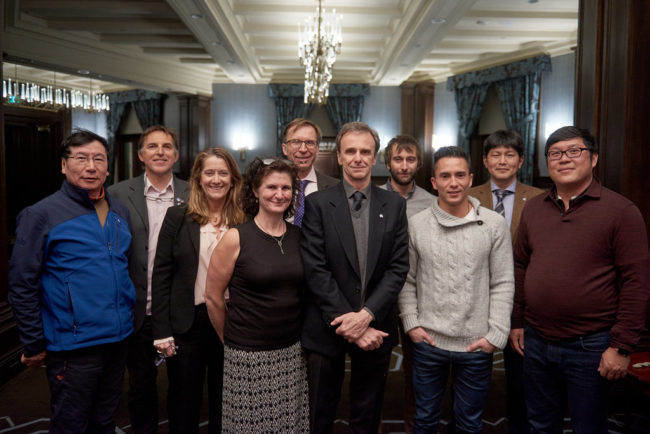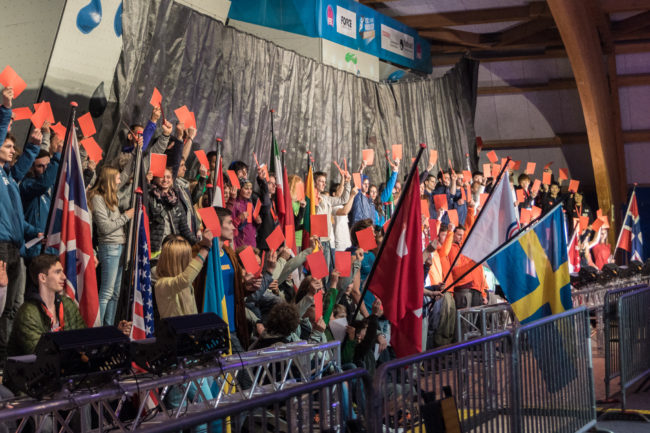 The bouldering World Cup that was held in the beautiful Swiss city of Meiringen was the first World Cup of the 2017 bouldering season. This event is usually marked by predictions of winners and losers and a celebratory feel. But in early April, an announcement was made regarding online viewing of international climbing competitions that would quickly become the focal point and draw all attention away from the competition.
The bouldering World Cup that was held in the beautiful Swiss city of Meiringen was the first World Cup of the 2017 bouldering season. This event is usually marked by predictions of winners and losers and a celebratory feel. But in early April, an announcement was made regarding online viewing of international climbing competitions that would quickly become the focal point and draw all attention away from the competition.
The International Federation of Sport Climbing and streaming service provider FloClimbing’s announcement that viewers would need a paid subscription to view World Cup competitions set off a firestorm across social media with angry Facebook comments that numbered in the thousands, outrage on Twitter and Reddit and the formation of a surprisingly effective Change.org petition.
The unprecedented partnership deal between the two organizations was supposed to set off a new era of live broadcasting of climbing competitions and begin a valuable revenue stream for the cash-strapped IFSC. Instead, it created what would become the fastest and largest backlash in climbing’s history and a lighting rod at the intersection of business and climbing.
The Back Story
The rationale behind the IFSC’s move to a paid subscription service is not entirely clear.
According to IFSC President Marco Scolaris, the reason to change the filming, production and broadcasting of each event had more to do with quality than with money. “The problem is that with this quality, which is decent for a stream, you can not bring to television,” Scolaris said in a recent Planet Mountain interview, conducted in Italian. Why is television broadcasting so important when many believe the Internet is taking over TV? Scolaris believes that if he can get the quality of production higher perhaps climbing will have a better shot of gaining popularity and even getting air time during the Olympics in 2020.
“It was thought that the web would surpass television, but instead this prediction … was not supported by the facts,” he said. According to Scolaris, television is still the way the majority of people consume media. “So you have to think about how to get there unless you want to stay where we are,” he told Planet Mountain.
But that’s not the whole story. The IFSC has an annual budget of €1.2 million ($1.4 million) and six employees. (For comparison, the US Federation, USA Climbing, has an annual budget of just over $2.3 million)
Scolaris said during an official press conference three weeks before the media debacle, “The sport is growing too fast and we do not have the resources to manage the sport. If it goes on in this way and our income does not increase and therefore we are not able to hire additional human resources. We will become victims of our success.”
All organizations, whether for-profit or non-profit, need to find ways to bring in more money if they hope to grow and be successful. The IFSC has limited avenues for revenue from their members and athletes. But they do have tens of thousands of people watching the free broadcasts of their events. So it’s reasonable that the IFSC would try to tap into that huge revenue potential.
The Deal
One way for the IFSC to capture the power of their streaming audience is to sell the rights to the broadcasting of their events. That’s where FloSports comes in. FloSports is a direct-to-consumer, subscription-based sports media company based in Austin, Texas, that partners with event rights holders and governing bodies like the IFSC. They provide filming and production for over 20 different sports which they broadcast on their subsidiary websites, including FloCycling.tv, FloRodeo.com and FloWrestling.org.
The less than one-year-old climbing channel, FloClimbing, is run by Jordan Shipman, who is the Senior Rights Acquisition and Subscription Manager at FloSports. Shipman has a long history in climbing media; in 2008 he started and co-founded, along with John Glassberg, the film and production company Louder Than 11, which is one of the most prolific production companies in the outdoor industry. Shipman left LT11 in 2016 after being recruited by FloSports to run their new climbing network. Their first event was the Dark Horse comp in October of 2016.
The IFSC declined to make available any person to talk about the Flosports deal and we don’t know the details of the contract. But Jordan Shipman of FloClimbing did speak candidly with CBJ about the deal. “In the beginning of negotiations the IFSC was more focused on the money we were going to pay them and less on where we were going to add value,” he told CBJ during a video call.

According to Shipman, the timing of the launch was a major factor in why the new deal failed. Shipman and Anne Fuynel, Marketing and Communications Director at the IFSC (along with the IFSC’s media consultant, Broad Reach Media) had been working on the particulars of the partnership agreement for seven months. Shipman first received notice that he had a deal with the IFSC two days before the IFSC’s Quebec Plenary Assembly which started on March 11, 2017 (The Plenary Assembly is a gathering of all member federations, the IFSC executive board as well as all IFSC committees and commissions).
There were still a few details that needed to be hashed out between lawyers on both sides which should have been quick to resolve. But due to language differences, an eight-hour time difference and other factors, the three-year broadcasting contract wasn’t ready to be signed until three days before the first World Cup event in Meiringen, Switzerland.
On the morning of April 5th Shipman woke up to an email from Fuynel informing him that Board President Scolaris and the General Secretary, Debra Gawrych, had approved the contract and although the contract had not yet been signed, because of the tight timeframe they were going to move forward with a press release announcing the partnership. FloClimbing also released a press release. “And then all hell broke loose,” Shipman said. “It wasn’t the way I wanted it to go down.”
Despite the incredibly short timeline Shipman and FloClimbing were willing to move forward with initiating the subscription model and broadcasting the Meiringen competition. FloClimbing would work with the French firm Obsess Medias, which was halfway through a two-year contract to film and produce events for the IFSC. But due to the rushed nature of the deal, no FloClimbing personnel would be in Meiringen to help with the production. Shipman said that he would need at least three months before an event to gather all the necessary resources to provide the type of broadcast he wanted.
Shipman knew FloClimbing needed to bring additional value to the streaming if it was going to be successful, which is why he was ramping up the hiring of full-time employees. Shipman wanted to put more people on site to produce individual profile videos and tell personal stories about the athletes. He wanted to add more camera angles, better instant replay and bring back streaming of the qualifier round (which had been eliminated a few years ago due to the cost of filming and production).
None of that was possible because of the timing of the contract. This essentially left the broadcasts exactly the same but now fans would have to purchase a $20 per month subscription with FloClimbing in order to watch events.
“If you take something that’s been available for free and put it behind the paywall, backlash is a pretty reasonable response to that,” Shipman said.
The Backlash
The public’s response to the announcement was swift, vicious and unanimous.
The IFSC’s and FloClimbing’s official Facebook pages quickly accrued hundreds of negative and angry comments all deriding the “greedy” nature of the partnership and accusing those responsible of being sell outs to the spirit of climbing.
To many of those complaining, FloClimbing looked like an outsider trying to make money off of the new popularity of climbing. “People were calling us greedy and posers,” Shipman said. They were also tracking down his personal phone number and leaving hateful voice messages. But it was Senior Content Manager, Bryan Rafferty, that was getting the majority of the backlash. Rafferty is more the face of FloClimbing and his name appears at the top of all content on the FloClimbing site. “Bryan was getting dozens of Facebook requests, saying things like fuck you, you piece of shit, Flo sucks, go to hell,” Shipman said. “It was really hard to watch people personally attack him.”

Shipman and Rafferty expected there to be some backlash to the announcement. But they were unprepared for the onslaught and from the moment the press release was public they were behind the ball. “At Flo, we did a poor job of educating the community to the benefits of what our model can do, not just for the IFSC but for the sport,” he said. “I see now many spots where we went wrong.”
Despite the backlash, people were still signing up for the streaming service. “We tripled our projections for that first event. It was working,” Shipman said. He believes that Flo could have weathered the storm of angry comments from the fans. But then the athletes starting making statements on blogs and Facebook posts blasting the decision by the IFSC.
Angered by the announcement, Peter Crane, a 26-year-old former Australia National Youth competitor and film producer, started a Change.org petition denouncing the streaming deal. That petition, which now has over 15,000 signatures, spread like wildfire and galvanized the resistance.
Then, during the opening ceremony in Meiringen, a mass protest organized by the athletes with the help of the Swiss federation resulted in a threat to boycott the comp and a photogenic “Red Card Campaign”. Nearly every competitor held up a large red card to protest the broadcast partnership (red cards are handed out to unruly athletes during comps, just like in soccer).

The athlete protest seemed to be about the deal but it turned out that it also had to do with how the IFSC communicated the deal to them. Or more precisely, how they did not communicate. The official Athlete Commission (and the member federations) were never notified or consulted about the deal. Scolaris admits as much. “From what I have heard, [the athletes] were not involved as a whole. On the other hand, however, the athlete’s commission has its own president who is part of the board,” he said. The Athlete Commission representative is currently Sean McColl, and he does sit on the IFSC executive board.
For Shipman, it was mind-blowing that the IFSC would act this way. “It never occurred to me that they were not doing the work they needed to do internally to ensure that this was a success for them,” he said.
“You would expect an organization like the IFSC to communicate with its stakeholders about its plans for the future,” Shipman said. “Especially when those plans for the future are going to affect those stakeholders so significantly.” But that’s exactly what happened and it may have sabotaged the whole deal.
The Response
At FloClimbing headquarters outside of Boulder, Colorado the hours and days after the announcement were a non-stop nightmare. They were attempting to come up with a strategy to deal with the tsunami of negative comments that were flooding social media and at the same time, Shipman was attempting to salvage the deal that was quickly disintegrating in front of him.
They were working with the IFSC to put out a joint response and provide a united front. They quickly learned that any response to the comments was going to backfire. There was so much animosity towards both organizations that no matter what they said the public would not back down. “We could’ve said that we were going to give everybody a thousand dollars and they would have still been pissed and said we were trying to buy them off,” Shipman said.
Since there was no central place to respond, a strategy of radio silence seemed appropriate to Shipman but angered the public even more.
Two days later, on the eve of the qualifier round for the Swiss comp, the IFSC put out a statement, its first since the original partnership announcement, saying that the comp would now be free to watch.
“FloSports formulated an offer to consumers, that is now under review, considering comments and recommendations that were received. FloSports made a first reformulation of their offer, that will guarantee a free of charge view of the upcoming event in Meiringen. In the next days, further talks will occur in order to provide the best possible offer for the next months.”
Shipman said that during those two days the IFSC was demanding that FloClimbing stream the first few events of the season on their platform for free. “We were willing to do this and a lot more,” he said. The problem was, according to Shipman, the IFSC was holding the contract signature hostage. “If we do all of this, we’re taking on a lot of risk financially if we can’t recoup our revenue with our business model,” he said.
And that’s when the negotiations broke down. Later that day on April 7th the IFSC put out another statement informing the public that the Swiss comp will be streamed on the official IFSC Youtube channel for free, and that all those who had purchased a subscription to FloClimbing would be refunded. Martin Floreani, Co-founder and CEO of FloSports, also put out a statement apologizing “for the inconvenience”.
It would take another five days for the IFSC to publically apologize for the fiasco, but for many the response rang hollow.
“It was made a mistake and we apologize for that. The live streaming for IFSC will remain free of charge, the same as it was at the 1st World Cup in Meiringen, Switzerland and in previous years. The deal – despite having been announced – has not been signed and thus has not been concluded. Any possible future variation of this policy will be discussed inside the IFSC and subject to the approval of our key stakeholders. Let’s keep climbing together.”
Subscriptions or Sponsorship
The Meiringen fiasco is over but the central issue remains: who will pay for the future of climbing media? In one camp are advocates of the sponsorship model which is based on companies paying for the privilege to advertise to an organization’s members.
In the other camp are promoters of a revenue model based on subscriptions: fans pay a premium, in this case, $20 a month for the privilege to watch competitions in the comfort of their own home.
Shipman wholeheartedly believes that subscriptions are the way forward and feels it’s inevitable that organizations like the IFSC and USA Climbing will have to transition from their current sponsorship model. For USA Climbing, sponsorship brings in just 11% of their total revenue, with The North Face being their largest sponsor.
“The IFSC knows they need to transition their live streams into a model that generates money,” Shipman said. He thinks that sponsorship and ad revenue will not be adequate for the growing demands of their members and of the sport. “IFSC hoped that FloSports was going to be the solution to transition their audience into a revenue-generating paid audience,” he said. “Which we could have been, it just didn’t work out right.”
Over the years, climbers have become so accustomed to watching comps and consuming other climbing media for free (CBJ included), that it’s going to be a hard road to get fans to pony up. “[Subscriptions] are aggressively trending in the sports world,” Shipman said. “Eventually, climbing is going to have to get on board. They may be kicking and screaming. But eventually, the community is going to catch on that this is the way it works now.”
Some opponents to subscription services have pointed out that sports such as professional surfing offer all of their events free of charge. Others have pointed to cricket and mountain biking as examples of how to successfully stream sports with the sponsorship model. However, not all is as it seems.
In the case of the beleaguered World Surf League, the organization was personally sponsored by the billionaire Dirk Ziff who guaranteed funding for three years. Those three years are now up and the future of free streaming is uncertain. In March, the WSL also lost their title sponsor, Samsung, and no company has stepped up to replace them.
For downhill mountain biking it’s true that Red Bull stepped up to provide free viewing of each event on their website. However, if Red Bull were to ever pull their funding those freebies would quickly end.
In fact, we’ve seen climbing competitions live and die by the sponsorship model before. The Unified Bouldering Championships (UBC), a pro bouldering circuit that ran between 2010 and 2012, was unceremoniously canceled when its main sponsor, Eastern Mountain Sports, pulled the plug leaving the comp series high and dry. No other company came in to pick up the pieces.
“If sponsorship is the way forward, where is the money,” Shipman asked. “Could you imagine what would happen if The North Face pulled all their sponsor money from USAC?” USA Climbing wouldn’t disappear but its free streaming coverage of Bouldering and Sport Nationals might be the first item on the chopping block.
“At the end of the day, all the sponsors are businesses who need to see an ROI with the investments that they make,” Shipman said. “How does getting more free views translate to The North Face selling more puffy jackets?”
Picking Up The Pieces
It has now been two months since the failed deal and the climbing public has mostly moved on. The negative social media comments have thinned to their normal trickle and both IFSC and FloClimbing have moved on to their next events.
FloSports and the IFSC have a lot of soul-searching to do to figure out how this kind of miscommunication could have happened. Scolaris says there is an internal investigation happening and that he hopes to, “eventually clarify the dynamics of this nonsense.”
For Jordan Shipman and the FloSports crew the path forward is the same as it always was; showcase underserved sports to dedicated fans and try to do it in a way that feels authentic and sustainable. He’s not sure if the IFSC deal can be resurrected. “That remains to be seen,” he said. He’s hopeful he can talk with representatives from the IFSC at the upcoming Vail World Cup.
So for now, Shipman is taking a breather and focusing on smaller grassroots events across the US. Comps like the So iLL Showdown and the Dominion River Rock Festival. “These are amazing events with great athletes showing up,” he said. “There’s all kinds of potential to grow those kinds of events into something special. That’s where FloClimbing can really make a difference.”

Climbing Business Journal is an independent news outlet dedicated to covering the indoor climbing industry. Here you will find the latest coverage of climbing industry news, gym developments, industry best practices, risk management, climbing competitions, youth coaching and routesetting. Have an article idea? CBJ loves to hear from readers like you!







